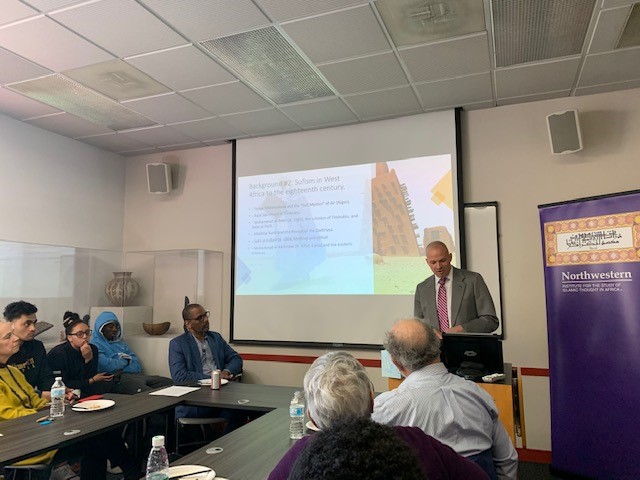At a recent meeting among scholars and researchers of the Islamic tradition in Africa, Zachary Wright, associate professor at Northwestern University in Qatar (NU-Q), delivered a lecture on "Intellectual Networks and Islamic Realization in 18th Century North Africa."
Northwestern’s Institute for the Study of Islamic Thought in Africa, part of the University’s African studies program, hosted the meeting as part of its winter quarter series.
During his talk, Wright traced the global networks that connected Muslim scholars in the 18th century, highlighting, in particular, the influence of West African and North African intellectual exchanges during that period. “The research pushes back against the narrative that the Sahara Desert is the barrier that definitively divides Arab Islam from black African Islam,” Wright explained.
“I’m suggesting that black African Muslim scholars were very influential—sometimes the teachers of their so-called white counterparts—and that many of the ideological or doctrinal developments that were happening in the 18th century were rooted in West African scholarly traditions,” he added.
In arguing that “West Africa anticipated many of the intellectual developments of the 18th century elsewhere in the Muslim world,” Wright provided numerous examples, including the emergence of the world’s most popular Sufi order today, the Tijaniyya, and their promotion of traditions well-known throughout the Islamic world of the 18th century.“The Tijaniyya movement originates in Morocco or Algeria around the 1780s, and since spreads all over to Indonesia and elsewhere. I’m basically rooting that development in a West African tradition, and thereby explaining why the Tijaniyya’s primary base today is in sub-Saharan Africa, and it is from there that it branches outwards,” he said.
Wright’s lecture is based on his recently completed book manuscript—being published by the University of North Carolina Press—called ‘Realizing Islam: The Tijaniyya in North Africa in the 18th Century Muslim World.”
“As a scholar of Islam in Africa, I find it interesting because this is a very large Muslim network—maybe a 100 million strong, dwarfing the Muslim Brotherhood—with unapologetic black African leadership on the world stage. To me, that’s an interesting story, so I’m trying to give the intellectual background for that,” he added.
Wright, who completed his graduate training at Northwestern, was a visiting scholar at the University’s home campus in Evanston in 2018 when he began working on the research for the book. He has participated in many of the programs and activities organized by ISITA and Northwestern since joining NU-Q in 2010.
